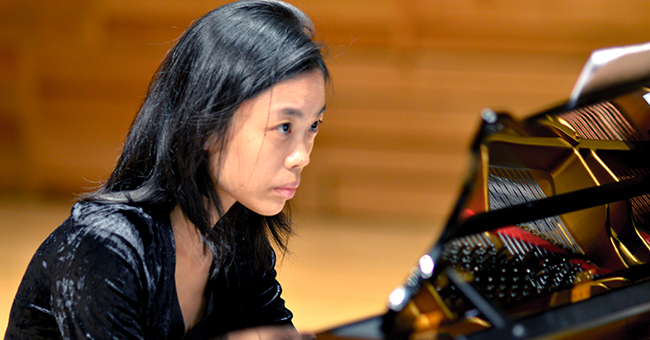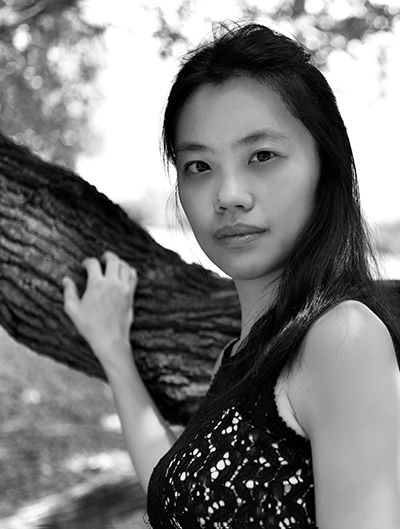Interview with Beatrice Lin
While most people think that piano pieces should sound melodious, one can’t help but sit up when Beatrice says, “I disagree because sometimes it has to be brutal.”
“Pianos can create a whole spectrum of sounds and emotions, but people may not dare to venture to the ugly side. Without the ugly moments, how can you make the beautiful moments sound nice? It’s about balance—if there’s no soft then there’s no loud,” she explains.
Upon graduating from Yong Siew Toh Conservatory of Music on a full scholarship from the National Arts Council, she went on to the Royal Academy of Music in London for postgraduate studies. She then completed a Masters Degree in collaborative piano at the Conservatoire de Musique de Genève.
Throughout her studies, she’s worked with renown pedagogues and artists and has also performed extensively throughout Switzerland. As a freelance musician today, she often collaborates with the choirs and singers at the Singapore Lyric Opera.
Life Growing Up
Beatrice:
I picked up piano at age 4, and violin at age 9. In secondary school, I played violin in the youth orchestra, and in JC I took music as one of my H2’s, alongside maths and economics. I did get an A for music but didn’t do too well for the rest.
After JC, I told my parents I wanted to study music at the NUS Yong Siew Toh Conservatory of Music but my parents insisted that I pursued something else—“Who listens to classical music? Where’s the career?”. I ended up attending FASS for a year but proved to them that it wasn’t the place for me.
Music isn’t just my passion. When words can’t convey how I feel, music gets my point across in a subtle way. I find feelings indescribable for the most part. But sometimes, the message gets lost when musicians get caught up in trying to imitate one another.
Today’s young musicians want perfection, but in the process of eradicating flaws, they tend to lose their voice and individualism.
If another musician’s work becomes popular, we might think that ours isn’t as appealing. If you can convince people that your own style can also sound beautiful, won’t that be even better?
Life in Switzerland
During my time at the Conservatoire de Musique de Genève, I lived in a town that was a 35-minute train ride away from Geneva. My fees were about S$2000 a year so I worked part-time to cover my living costs.
Every morning, I’d wake up at 7.00am to eat breakfast and be at school by 9.00am, where I’d practice till 1.00pm. Since I was on a shoestring budget, I’d take the train back home to cook lunch, then back to school to continue practising. There’ll always be pieces to practice and work on because the moment you lapse for too long, it’ll be quite difficult to get back in the groove again.
The right teacher at the right time
You can have the best teacher in the world but if the time isn’t right, you might not grasp a concept properly.
It’s been a few years since I’ve had lessons, but it’s only now that I remember certain phrases my teacher said. It can take years for these words of advice to settle and help you evolve.
After my first graduation recital, I felt immensely drained. I knew there was something I didn’t get right. After reflecting, I started to actually listen to what I was playing while I was playing—that was the turning point for me, to listen with a “third ear.” I finally understood what it meant to be a musician and to communicate something in the language of music.
Playing chords in colours
My mentor told me that you shouldn’t play two chords the same. He’d say, “Play this chord in dark blue and the second chord in orange.” Back then, I didn’t understand what he was saying, but now I see chords in colours because harmonies make more sense that way.
At the end of the day, the piano is a percussion instrument and it’s quite difficult to make it sound musical because it’s just a hammer hitting string. To make it sound musical, you need to use your imagination.
The importance of maturity and discipline
As a musician, there are certain things you’ll pick up with age. For the past few years, I’ve picked up on articulation and timing. Articulation is particularly challenging on the piano, as the different accents and staccatos you put in do make a difference, however small. Without articulation, it’s like someone speaking without consonants.
Maturity and understanding are also important—an example is tempo rubato; to play with expressive and rhythmic freedom.
If students are too young and you tell them to play freely, they might play any rhythm they deem correct. But in order to play in a “free” way, you first need strict practice with a metronome. It’s almost robotic because you need to internalise the shape and structure of the music before you can make the music “free”.
How music helps one to grow
At times, I felt that playing the piano for a living was impractical because people assume a musician only knows how to play their instrument. But I believe that being a musician and being an artist is slightly different.
Being an artist is being able to appreciate different forms of the art; theatre, jazz, and even pop music. Music has allowed me to grow and see things from different perspectives, as well as develop communication and people skills that are essential in every job.
For example, you might be asked to play something with someone that you don’t even know or like, so it’s challenging when you have to practice together for a live concert. At the end of the day, it’s about how you communicate your ideas to the person and how willing you are to compromise.
People don’t see the blood, sweat, and tears behind every soulful melody. Once, I was doing a recital with a flautist and after playing the first piece, the cracked skin on my fingers split open and left blood all over the piano keys. But at the end of the day, the struggle to perfect your art is worth the pain when your music touches the hearts of your audience.
Singaporean Female Musicians
On April 24, Beatrice will be performing with her husband, Siew Yi Li, a violinist, at a concert titled ‘Les Sonates Francaises’ at the Esplanade Recital Studio for Voilah! French Festival 2017.









